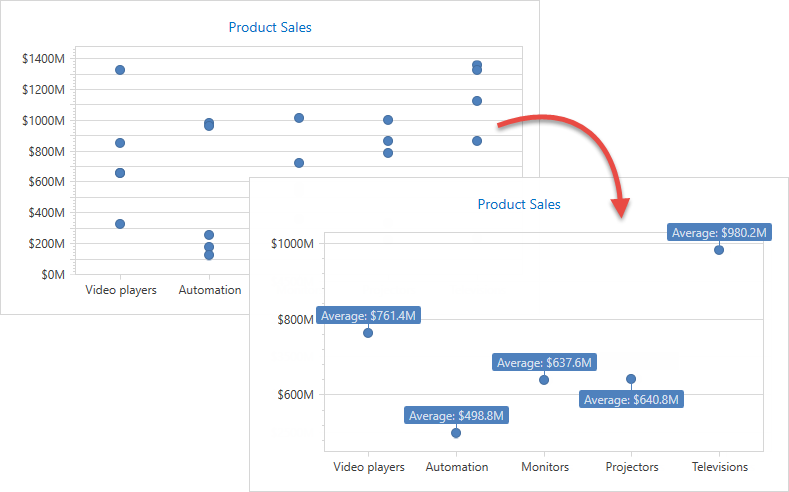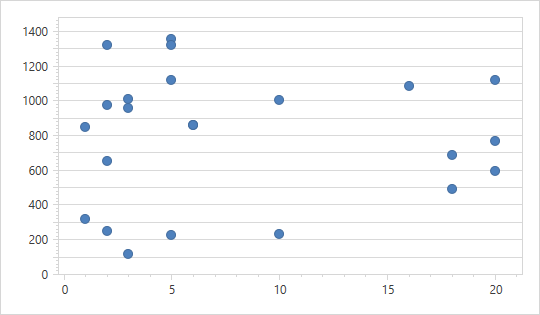Summary Class
Stores the series data point summarize options.
Namespace: DevExpress.Xpf.Charts
Assembly: DevExpress.Xpf.Charts.v25.2.dll
NuGet Package: DevExpress.Wpf.Charts
Declaration
Related API Members
The following members return Summary objects:
Remarks
The Function property allows you to set an aggregate function that calculates the series point value summaries.
The following built-in functions are available:
- AverageSummaryFunction
- CountSummaryFunction
- MaxSummaryFunction
- MinSummaryFunction
- SumSummaryFunction
For the Average, Max, Min and Sum functions, specify the ValueDataMember property to define a data source field that provides data to be aggregated.
For numerical and date-time x-axis scales, the function aggregates data point values for each interval specified by the MeasureUnit (NumericSummaryOptions.MeasureUnit or DateTimeSummaryOptions.MeasureUnit) property.
The following images illustrate how the measurement unit’s change affects point summarization:
Example
The example demonstrates how to apply AverageSummaryFunction to aggregate data points.

Use the following API members to configure the summary function options:
| Member | Description |
|---|---|
| Series.Summary | Gets or sets the series data point summarization settings. |
Summary |
Stores the series data point summarize options. |
| Summary.Function | Specifies the summary function that calculates data point values. |
| AverageSummaryFunction | The summary function that calculates the average of data point values. |
| DataMemberSummaryFunction.ValueDataMember | Gets or sets the data source field that provides data to be aggregated. |
<Window.DataContext>
<local:ChartViewModel/>
</Window.DataContext>
<Grid>
<dxc:ChartControl>
<dxc:XYDiagram2D SeriesItemsSource="{Binding SaleSeries}">
<dxc:XYDiagram2D.SeriesItemTemplate>
<DataTemplate>
<dxc:PointSeries2D DataSource="{Binding Values}"
ArgumentDataMember="Category"
ValueDataMember="Value">
<!-- Configure the summary function options. -->
<dxc:PointSeries2D.Summary>
<dxc:Summary>
<dxc:Summary.Function>
<dxc:AverageSummaryFunction ValueDataMember="Value"/>
</dxc:Summary.Function>
</dxc:Summary>
</dxc:PointSeries2D.Summary>
<!--...-->
<dxc:PointSeries2D.Label>
<dxc:SeriesLabel Visible="True" TextPattern="Average: ${V}M"
dxc:MarkerSeries2D.Angle="90" ResolveOverlappingMode="JustifyAroundPoint"/>
</dxc:PointSeries2D.Label>
</dxc:PointSeries2D>
</DataTemplate>
</dxc:XYDiagram2D.SeriesItemTemplate>
<dxc:XYDiagram2D.AxisX>
<dxc:AxisX2D TickmarksMinorVisible="False"/>
</dxc:XYDiagram2D.AxisX>
<dxc:XYDiagram2D.AxisY>
<dxc:AxisY2D Interlaced="False">
<dxc:AxisY2D.WholeRange>
<dxc:Range dxc:AxisY2D.AlwaysShowZeroLevel="False"/>
</dxc:AxisY2D.WholeRange>
<dxc:AxisY2D.Label>
<dxc:AxisLabel TextPattern="${V}M"/>
</dxc:AxisY2D.Label>
</dxc:AxisY2D>
</dxc:XYDiagram2D.AxisY>
</dxc:XYDiagram2D>
<dxc:ChartControl.Titles>
<dxc:Title Content="Product Sales" HorizontalAlignment="Center" FontSize="14"/>
</dxc:ChartControl.Titles>
</dxc:ChartControl>
</Grid>

 is applied. [NumericSummaryOptions.MeasureUnit](xref:DevExpress.Xpf.Charts.NumericSummaryOptions.MeasureUnit) = 1](/WPF/images/chart-control/summary-measurement-unit-1.png)
 is applied. [NumericSummaryOptions.MeasureUnit](xref:DevExpress.Xpf.Charts.NumericSummaryOptions.MeasureUnit) = 5](/WPF/images/chart-control/summary-measurement-unit-5.png)